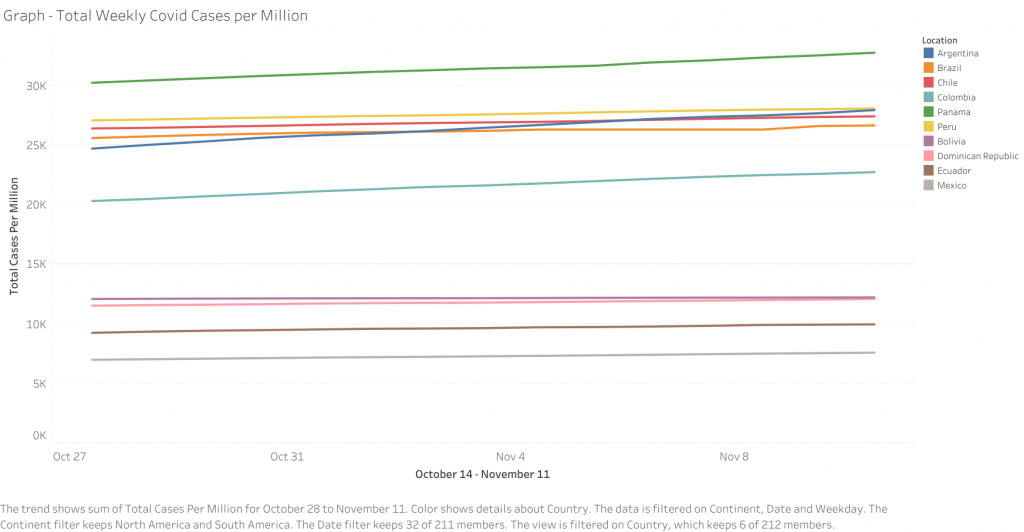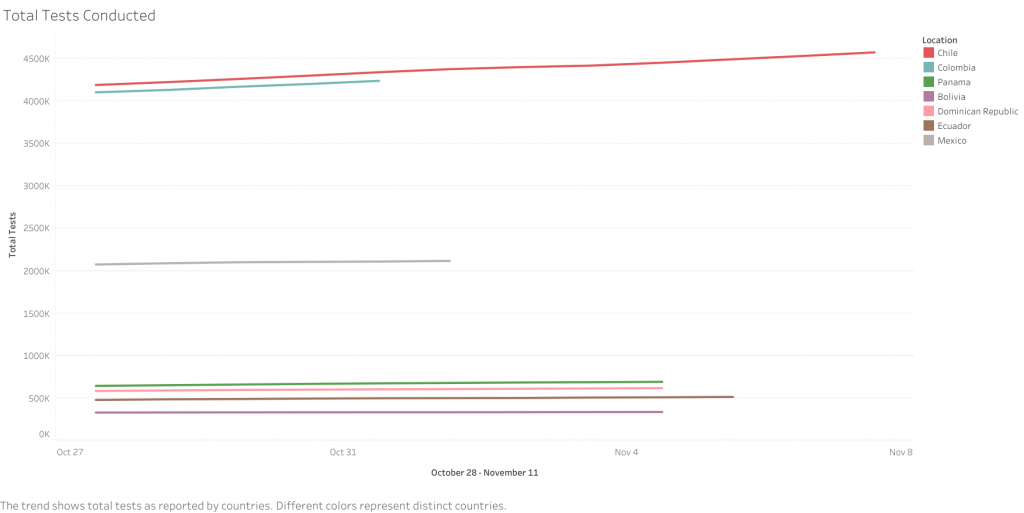What you should know
- Congratulations have poured in for President-elect Joe Biden from across the region, except from Brazil’s Jair Bolsonaro and Mexico’s Andrés Manuel López Obrador.
- 47 million: That’s the number of jobs lost across the region in the second quarter of 2020, according to the UN Economic Commission for Latin America and the Caribbean’s new report.
- COVID-19 vaccine? The Pan American Health Organization says that an approved vaccine could be available for distribution and administration during the first half of 2021.
- 261 days ago: On February 26, the first COVID-19 case was documented in Latin America (Brazil). Here are this week’s latest figures.
Quarantine + reopening plans
As COVID-19 becomes part of normal life, countries are shifting their focus to phased reopening.
- After seven months of lockdown measures, Argentine President Alberto Fernández announced a new “stage of social distancing” in the Greater Buenos Aires (GBA). This new stage allows citizens to move about GBA without authorization, although public transportation will continue to be restricted to essential workers. Activities involving crowds – such as theatres and cinemas – will continue to be prohibited.
- Eight districts in Chile’s Santiago Metropolitan Region advanced to the Phase 4 of Chile’s 5-phase Step-by-Step Plan. Phase 4 allows for the resumption of certain activities with small crowds and low contagion risks.
- Two Mexican states – Durango and Chihuahua – remain under the highest level (red) of coronavirus alert. Another 18 are in orange and 11 are in yellow. In the last week, Mexico has seen an 18 percent decrease in COVID-19 cases.
- The closing of schools in Honduras due to the COVID-19 pandemic has caused more than 850,000 children to miss classes. Those affected live mostly in rural regions without access to internet.
- On November 4, Cuba reported 109 new cases of COVID-19, a record number in seven months.
International travel restrictions
- Paraguayan authorities announced that from November 15 onwards, mandatory quarantine for international travelers will be eliminated. However, a negative PCR test, taken within 72 hours before flying, will continue to be a mandatory requirement for travelers.
- On November 7, Trinidad and Tobago Prime Minister Keith Rowley announced that travelers must have a negative PCR test within two days prior to arrival and will be placed in quarantine facilities for a week.
- On November 5, Colombia’s Ministry of Health announced that a negative PCR test will no longer be required for passengers entering the country.
Economies in focus
Economic Impact
- From the World Economic Forum: output across the region will be 10 percent lower in 2020 than was forecast in late 2019, joblessness is in double digits, and nearly 15 million more people will be pushed into poverty.
- Argentina registered the second-highest inflation in the region for October: 3.2 percent. This brings the country’s latest 2020 inflation projection to 35.8 percent.
- Brazil’s government is willing to extend emergency fiscal support in 2021. According to Economy Minister Paulo Guedes, spending could total about 4 percent of GDP in the case of a second pandemic wave.
- Between the first and second quarters of 2020, the share of young people (aged 15-24) in employment fell from 8.3% to 6.0% in Chile, from 12.1% to 9.6% in Costa Rica, and from 15.0% to 13.3% in the Dominican Republic.
Economic Relief
- On November 8, Latin American development bank CAF signed off on Mexico’s accession as a full member. Mexico will have greater access to financial resources, technical cooperation, and a permanent seat on the Board of Directors.
- El Salvador’s Ministry of Finance transferred $75 million of its $250 million Inter-American Development Bank (IDB) loan to municipal governments. A legislative decree mandates that 30 percent of all COVID-19 emergency funds must be transferred to El Salvador’s municipalities.
- The IDB approved a $22 million loan to strengthen Guyana’s public health response to the COVID-19 pandemic.
Resilience, recovery + renewal
Today’s environment demands that organizations move quickly while thinking deeply. Baker McKenzie’s Beyond COVID-19 Resource Center tracks up-to-the-minute alerts as well as big picture analysis across a variety of countries, industries, and legal and business issues. Here are the latest updates from the region:
- US Shelter-In-Place / Reopening Tracker is a valuable resource that identifies state-wide shelter-in-place orders and their related expiration dates as well as state-wide reopening plans in each of the 50 United States and Washington, DC. The Tracker is updated weekly.
- The Employer Rapport is the new video chat series for US employers highlighting practical tips on today’s most pressing issues as we navigate the new normal.
- November 9, 2020, Argentina modifies mandatory isolation and distancing rules in metropolitan areas.
- November 9, 2020, an update on Mexico’s reopening of economic activities.
- On 4 November 2020, the State of Chihuahua Governor issued executive order 127/2020. Manufacturing activities, including those considered essential, remain operating normally from Monday to Friday under the same restrictions, but now shall close activities during the weekend.
- China played a key role in supporting Latin America to recover after the 2008-2009 global financial crisis. Will that be the case again after the coronavirus (COVID-19) crisis? Has the coronavirus pandemic changed China’s priorities in the region? During the GRI Club eMeeting on 18 August 2020, GRI members from Spanish speaking countries and Chinese players, including speakers from Baker McKenzie, discussed these issues.
- Argentina is set to join with a new law the list of countries that have approved regulations to favor and accelerate the research, development and acquisition of Covid-19 vaccines. In a recent law approved by the Senate (which has yet to be promulgated by the President), broad and exceptional powers have been granted to the National Executive Power (the “Executive“) to negotiate the expedited purchase of such vaccines.
Health + innovation
- On November 9, Pfizer announced its COVID-19 vaccine was more than 90 percent effective in preventing the virus among trial volunteers. After recollecting the required two months of safety data later this month, Pfizer will request emergency authorization of the vaccine from the Food and Drug Administration (FDA).
- Also on November 9, Brazil’s health regulator Anvisa said it had suspended clinical trials of China’s Sinovac coronavirus vaccine after a “severe adverse event.”
- Eli Lilly’s COVID-19 antibody therapy was granted emergency-use authorization by the FDA on November 9. Data suggest the treatment is effective in keeping adults with mild-to-moderate COVID-19 conditions out of the hospital.
- On November 10, Mexican Foreign Minister Marcelo Ebrard announced Johnson & Johnson’s Janssen unit will carry out late stage trials for its COVID-19 vaccine in Mexico. Ebrard said US vaccine developer Novavax Inc has also requested to conduct phase 3 testing in Mexico.
Country Focus
- Bolivia: On November 8, Luis Arce was sworn in as President of Bolivia. A day after, former president Evo Morales returned to the country, crossing the border from Argentina.
- Argentina: Protests against the administration of President Fernández broke out in Buenos Aires, Cordoba, Rosario, Mar del Plata, Mendoza, and San Carlos de Bariloche on November 8.
- Peru: Peru’s Congress voted to impeach President Martin Vizcarra over accusations of corruption and his handling of the pandemic. Vizcarra denied the corruption allegations as “baseless” and “fraud”.105 of Peru’s 230 lawmakers voted to remove him. Congress President Manuel Merino was sworn in as President of Peru on November 10, following Peru’s line of succession established in its constitution.
By the numbers
- Cases by country: Brazil (5,730,361) #3 worldwide, Argentina (1,262,476) #7 worldwide, Colombia (1,156,675) #9 worldwide, Mexico (978,531) #11 worldwide, Peru (925,431) #12 worldwide, Chile (524,804) #17 worldwide, Ecador (176,630) #36 worldwide, Bolivia (142,644) #40 worldwide, Panama (141,302) #41 worldwide, Dominican Republic (131,265) #44 worldwide, Source: worldometers.info
- Prevalance rate (total cases per million people): Aruba (43,224) #5 worldwide, Panama (32,565) #15 worldwide, Peru (27,928) #21 worldwide, Argentina (27,8410) #22 worldwide, Chile (27,368) #23 worldwide, Brazil (26,890) #24 worldwide, Costa Rica (23,434) #28 worldwide, Colombia (22,645) #31 worldwide, Bahamas (17,770) #43 worldwide, Saint Martin (15,033) #52 worldwide, Source: worldometers.info
- Deaths per captia (deaths per million people): Peru (1,056) #3 worldwide, Brazil (765) #6 worldwide, Chile (763) #7 worldwide, Argentina (754) #8 worldwide, Bolivia (751) #9 worldwide, Mexico (741) #11 worldwide, Ecuador (728) #13 worldwide, Panama (649) #16 worldwide, Colombia (649) #17 worldwide, Aruba (3930 #30 worldwide, Source: worldometers.info
Quick take


Sponsored By

